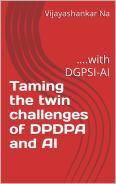Arbitration and Mediation are often spoken off in the same breath as if the two are closely related. Though Arbitration and Mediation belong to the family of “Alternate Dispute Resolution” (ADR), it is to be recognized that the processes are widely different and requires different skills. All Arbitrators donot make good Mediators and need to accept the situation and live with it.
Where as in a Mediation, the intervening neutral party namely the Mediator tries to bring about a settlement between the disputing parties by using his “Behavioural Analysis Skills”, without the legal authority to issue a mandatory order, an Arbitrator has the authority given to him by the parties themselves to issue a binding award.
There is a third type of ADR process called Conciliation which is similar to Mediation but where the Mediator is a person with some authority and respect and therefore can nudge the parties to come to a settlement though his legal authority is not more than that of a mediator.
An Arbitration is more suitable when the disputes are likely to have legal issues to be interpreted. Mediation/Conciliation is more suitable when the issues to be settled are technical in nature or involve emotional issues.
When a legal practitioner is called upon to assist in a Mediation process as a Counsel or act as a Mediator, the legal practitioner has to understand the nature of the dispute and whether he should accept a role in the resolution.
When we try to resolve an “Emotional” issue through a judgement of a Court, even if the judgement is given by an authoritative Court, the parties may end up dissatisfied. Similarly issues in which lot of technicalities are involved may easily be mis-interpreted even by experienced Judicial authorities.
If the objective of “Dispute Resolution” is to bring about an amicable settlement or what we call as a “Win-Win” outcome, there is a need to explore the Mediation and Conciliation options more than Arbitration and Litigation.
An advocate by nature is trained to look at issues from the point of view of a legal provision and earlier Court decisions. Similarly, when a Judge acting as an Arbitrator looks at a dispute, his primary focus again is on what the law says.
Mediation on the other hand works on bringing about a settlement between the disputing parties in a fair manner without any party being mislead about their rights or not being given a fair opportunity to assert their rights.
Some times a resolution which both disputants agree upon may not find a direct provision in law or it may even appear to be different from an earlier Court decision. A trained advocate would find it uncomfortable in accepting it as a proper resolution even when it is the informed choice of the parties.
The Mediator as well as any advocate who participate in Mediation to assist the parties should be able to fully digest this difference between the litigation and arbitration process on the one hand and Mediation on the other and discharge their responsibilities.
In behavioural science, there is a term called “Role Set”. It is a tendency to behave in a set role pattern even when the person has moved onto to a different role responsibility. In a simple example, when a subordinate “clerk” is promoted and pushed into a decision making “Officer” role, he often continues to behave more like the Clerk than an officer, He often is reluctant to take decisions, and expects some body else to take the decision which he may efficiently implement. This has nothing to do with inefficiency but because of a habit formed in the earlier role with which he is comfortable. But in an organizational environment, this “Role Set” behaviour is dysfunctional since any person promoted to a higher responsibility fails to get over his behavioural traits of the previous position and therefore becomes less effective than what he should otherwise be.
In the same manner when a good Judicial person or a Good lawyer moves into a Mediation room, they may have a tendency to replay their litigation experience and bring in the known CPC procedures and Case laws to settle the mediation. They may not realize that their role in the mediation should be only to maintain an informed decision making environment in which the disputing parties come to a settlement in a manner which will retain their friendly relationship with which they entered into the earlier contract so that they can move on in life after resolution as if the dispute is a thing of the past.
There is no doubt that this is difficult for established advocates to appreciate and accept that a “Win-Win” solution is better in mediation than a “Win-Lose” situation which is the average norm in litigations.
It is for this reason that subject experts and non advocates become more effective Mediators as we see in the field of “Marriage Dispute Resolution”. In an emotionally charged situation such as a “Divorce”, it is the spirit of reconciliation which is a better option to be invoked rather than what is the “right” under law. Successful divorce advocates are therefore more “Counsellors” than advocates and should be able to switch roles easily.
Though business disputes need not be as emotional as a divorce, Advocates and Mediators who engage in Mediation must consciously avoid the “Role Set” problem and be able to think differently.
Probably, Mediators or Advocates in Mediation need to undergo a “Behavioural Training” to understand the problems of “Role Set” and how to overcome them.
Naavi








